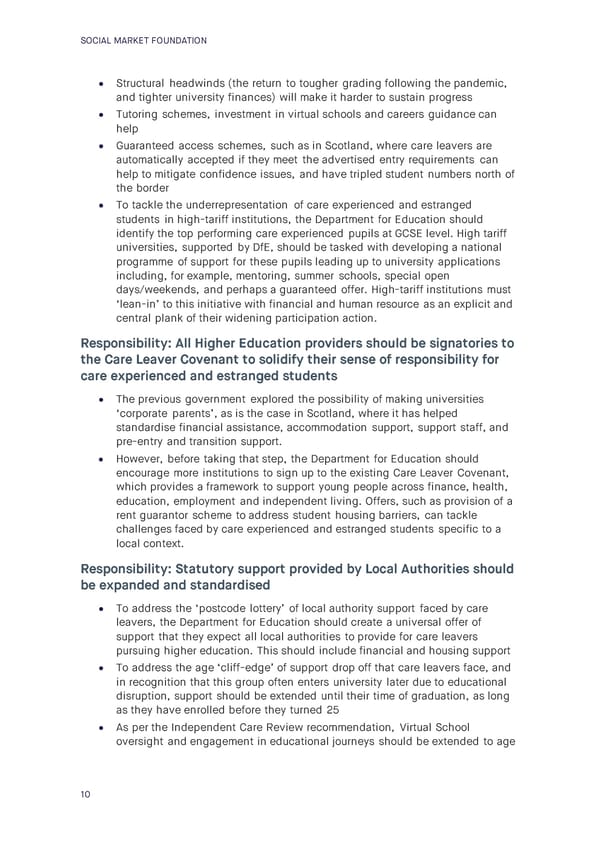SOCIAL MARKET FOUNDATION • Structural headwinds (the return to tougher grading following the pandemic, and tighter university finances) will make it harder to sustain progress • Tutoring schemes, investment in virtual schools and careers guidance can help • Guaranteed access schemes, such as in Scotland, where care leavers are automatically accepted if they meet the advertised entry requirements can help to mitigate confidence issues, and have tripled student numbers north of the border • To tackle the underrepresentation of care experienced and estranged students in high-tariff institutions, the Department for Education should identify the top performing care experienced pupils at GCSE level. High tariff universities, supported by DfE, should be tasked with developing a national programme of support for these pupils leading up to university applications including, for example, mentoring, summer schools, special open days/weekends, and perhaps a guaranteed offer. High-tariff institutions must ‘lean-in’ to this initiative with financial and human resource as an explicit and central plank of their widening participation action. Responsibility: All Higher Education providers should be signatories to the Care Leaver Covenant to solidify their sense of responsibility for care experienced and estranged students • The previous government explored the possibility of making universities ‘corporate parents’, as is the case in Scotland, where it has helped standardise financial assistance, accommodation support, support staff, and pre-entry and transition support. • However, before taking that step, the Department for Education should encourage more institutions to sign up to the existing Care Leaver Covenant, which provides a framework to support young people across finance, health, education, employment and independent living. Offers, such as provision of a rent guarantor scheme to address student housing barriers, can tackle challenges faced by care experienced and estranged students specific to a local context. Responsibility: Statutory support provided by Local Authorities should be expanded and standardised • To address the ‘postcode lottery’ of local authority support faced by care leavers, the Department for Education should create a universal offer of support that they expect all local authorities to provide for care leavers pursuing higher education. This should include financial and housing support • To address the age ‘cliff-edge’ of support drop off that care leavers face, and in recognition that this group often enters university later due to educational disruption, support should be extended until their time of graduation, as long as they have enrolled before they turned 25 • As per the Independent Care Review recommendation, Virtual School oversight and engagement in educational journeys should be extended to age 10
 Care and Learning in Higher Education Page 10 Page 12
Care and Learning in Higher Education Page 10 Page 12